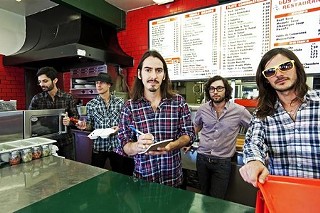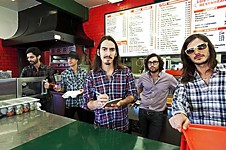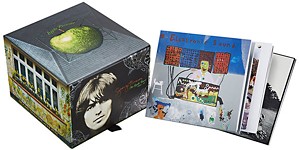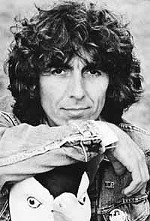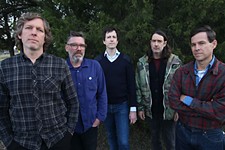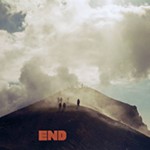Heart Gently Weeps
All things must pass: Dhani Harrison and Thenewno2
By Austin Powell, 12:22PM, Fri. Oct. 30, 2009
Dhani Harrison didn’t just help create The Beatles: Rock Band. He lived it. Having laid to rest the sessions for his father George’s posthumously released final album, 2002's Brainwashed, Harrison hits his stride with Thenewno2, which opens for Wolfmother tonight at Stubb’s.
Off the Record: Did you use your father’s studio for You Are Here?
Dhani Harrison: Oh, yes. That was the initial motivation. If we didn’t make music on that system, I would slap myself. My dad loved recording on tape and had all these great tape machines. I grew up with Final Cut Pro so I was much more used to using digital. Once my dad was no longer around, I was looking at all these amazing machines and realized this is not the way I’m going to make my record. But it’s sacrilegious to change anything in the studio cause it’s such a great space and has so much great energy. I went to great lengths to make myself a tape room and change the whole system so that it was all still the same boards, the same everything, except the tapes ran as a slave to Protools so that we didn’t lose any of the sound. We just got to have the files in ProTools so that we could do Midi programming and we could edit in that.
OTR: That seems like a pretty reasonable compromise.
DH: He would have killed me if he saw how much floor I had to take up to lay the cables [laughs]. We actually mastered [Mantram]: Chant of India, which is a record by dad produced by Ravi Shankar, in the room. A lot of the time we were listening to demos for the Love soundtrack and you couldn’t really listen to it unless you went to Abbey Road in a proper listening suite. So we got our studio set-up so that we can actually work and listen. The guy that mixed my record also mixed the Love show, Paul Hicks.
OTR: Judging from all that’s going on in You Are Here, it sounds like you would’ve appreciated the remixing and re-contextualizing that went into the Love record.
DH: Oh completely. I figured once The Grey Album came out… Danger Mouse must have worked so hard to get all of those little bits from the actual CDs and not from multi-tracks. I think everyone saw that as what people are doing with the music and needed to appreciate that. I love The Grey Album. I love Jay-Z. It’s one of those things. Danger Mouse made it obvious. So now you have Jaydiohead; they’re mixing everything with everything. Love was great because everyone saw it as a way where we could actually go town on it and make it aurally spectacular. But I digress. I have responsibilities to help out where I can with my dad’s catalog. It’s kind of really stuck me in the deep end. Now that the studio is fully functioning, I can make as many records as I want, and it all works. It takes a long time to get everything that way.
OTR: At one point did you start focusing on Thenewno2?
DH: It started as a design company, a name that I could do different jobs for without having my name on things. We just decided that when we would do the music we’d keep the name. That was probably 2002.
OTR: Were you hesitant to embrace your legacy?
DH: I’m not one of those people who’s not going to talk about it. I’m proud to be related to my dad cause he’s a lovely guy and taught me a lot, but sometimes people have preconceived ideas when they hear a name. In terms of the music, it serves it better that people get to hear it without baggage so people to decide whether or not they like it. That way you know if you really know if you’re reaching people.
OTR: You Are Here bears some very distinct Harrison traits, but there are also a lot of modern influences. What sort of stuff were you able to turn your father onto?
DH: He had very broad musical tastes. There were few things that I could play for him that he hadn’t actually heard. One person that he’d really liked that I played for him was Ben Harper, his first album in particular. I was listening to a lot of Wu-Tang Clan and Tricky and Prodigy. He couldn’t relate to that. A lot of acid house stuff that was going on in England – all the raves and Bristol trip-hop stuff – he wasn’t really into that. Another artist that he had forgotten about was J.B. Lenoir, the blues singer. He had this great strong tenor voice. We used to listen to a lot of blues together: Leadbelly, Robert Johnson, and Elmore James. He got me into Buddy Holly. That’s why I started playing a Fender Strat. I was obsessed with of all those great songs.
OTR: So he wasn’t a Wu-Tang fan. What would he have thought of your collaborations with GZA and “Heart Gently Weeps?”
DH: He respected the philosophy of the Wu-Tang Clan. I explained to him the ideology behind it, the bravery of challenging your surroundings and making it what you wanted. He appreciated the complicated rhymes and poetic-ness. He was really not a fan of offensive rap, like NWA and Public Enemy. They were too aggressive. I explained to him that if you listen to the Wu-Tang lyrics, they’re rapping about monks and ninjas, not money and hoes. He appreciated that. At the same time, in the Nineties, I read a quote from Bob Dylan saying that he listened to Public Enemy and NWA cause they were the only ones saying anything from the streets of the people. All styles of music were welcome in my life. I listened to Indian classical music, a lot of ukulele music, but the Bristol Nineties scene, that was very cool.
OTR: Since you’re the expert I have to ask. I can’t afford both versions of the Beatles remasters: mono or stereo?
DH: I’m the stereo generation, so I’ve only heard them in stereo. I have vinyl, but I’m not a buff on it. If you want to be really serious about it, mono up until The White Album and then the stereo after that. I’ve been listening to the mono in my car. It sounds fantastic. There’s no real answer.
A note to readers: Bold and uncensored, The Austin Chronicle has been Austin’s independent news source for over 40 years, expressing the community’s political and environmental concerns and supporting its active cultural scene. Now more than ever, we need your support to continue supplying Austin with independent, free press. If real news is important to you, please consider making a donation of $5, $10 or whatever you can afford, to help keep our journalism on stands.
Ken Lieck, Dec. 7, 2001
Nov. 3, 2023
Sept. 29, 2023
Dhani Harrison, George Harrison, Thenewno2





